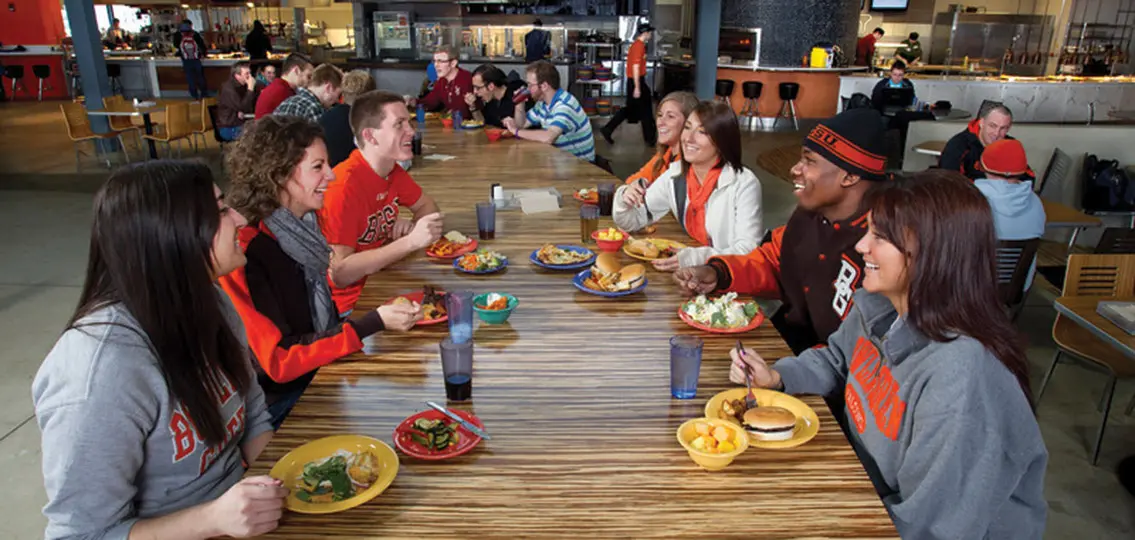Soon after dropping off my college freshman, I received one of the best texts: “My dining hall has this amazing pasta dish with broccoli and chicken!” I won’t lie; my heart leapt and not just because I was delighted he was using that spendy meal plan.
His go-to dish had a vegetable! And a protein! It sounded relatively well-balanced—and that was saying something for a kid who could have lived on pizza alone.
Here are four common fears parents have surrounding college nutrition—and some ideas to prepare your child for how to eat healthy in college.
How to Be a Healthy Eater in College
 1. My kid is too picky.
1. My kid is too picky.
Helping teens expand their palate can be a daunting challenge, but starting while they’re home is best, says Cathy Posey, a registered dietitian and author of the blog HappyHouseful.
She recommends discerning the source of their pickiness—it’s probably a smell, texture, or a specific taste receptor, such as bitterness or sourness. “If you can pinpoint the real objection, you can help them learn to work around it,” she says. For example, “a teen who doesn’t usually like squash may discover it’s delicious when grilled and generously seasoned.”
Your teen may also naturally gravitate towards new foods that their friends are trying.
“College students’ eating habits change as they eat with friends and inevitably sample new things,” says Jon Zachrich, dining director of marketing and communications at Bowling Green State University (BGSU). He recalls trying his school’s homemade sushi because his hallmates were all grabbing containers to go.
2. My kid won’t eat healthfully at school.
Unlike in our own college days, perhaps, college dining halls now make an effort to present healthy options. At BGSU, says Zachrich, they make the salad bar appealing by swapping in new ingredients on a regular basis.
This is the time to provide your teens with a basic nutrition vocabulary so they will recognize how to eat healthy in college. “Teach teens that the old saying, ‘you are what you eat’ is the absolute truth,” says Posey. That means talking to them about how to get a healthy mix of protein and vitamins and minerals to keep their body strong and help them feel their best.
| [adrotate banner=”125″] |
3. My kid has a special diet.
“Begin early to equip your son or daughter with an understanding of their own dietary needs and the cost of ignoring restrictions,” Posey says, recommending that before they leave home, teens learn to better understand ingredients by at least sometimes shopping for and preparing the special foods they need.
Fortunately, most college dining hall food services are on board. “Here at BGSU, as at most universities, we have a full-time campus dietitian who works with families,” Zachrich says. They also label dishes with easy-to-spot icons so students know what to look for and what to avoid, and they offer vegan as well as vegetarian options.
4. My kid will use up all their swipes right away—or won’t use their meal plan at all.
The last thing a parent wants is for their child to eat out regularly rather than access their already paid-for food. In addition, many schools offer a program like “dining dollars” where funds that can be used at coffee or quick service places are gone quickly if not monitored.
As parents, we know it’s easy to stop at the drive-thru on the way home from the soccer game—and it’s also easy to quickly blow through the family budget. You can start teaching this concept by allocating a certain amount of money for your teen to spend on dining out each month; once it’s gone, they’ll need to brown-bag it or switch from a fancy coffee drink to water.

The eventual objective is for them to understand that swipes for college dining hall food are money. As a teen said in a recent meme, “Once I started spending my own money, I realized my mom was right. We do have food at home.”






